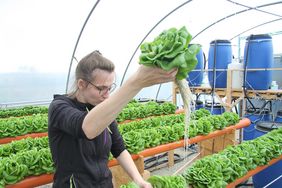In times of drought: Case studies show feasibility of water reuse in agriculture

Extreme weather conditions such as prolonged periods of drought represent new challenges for agriculture. What is needed are water-saving irrigation technologies and plant productions that can operate more independently of long periods of drought. This is where hydroponic cultivation, which requires little water, comes into play. In the HypoWave research project, this kind of production is being tested with specially treated wastewater. The first case studies show the feasibility of this water- and nutrient efficient agricultural production.
In these times of climate change, in which extreme weather conditions such as periods of drought occur even in Germany, adaptation measures in agriculture will be necessary. Especially in regions with low water supplies, agricultural production requires the majority of the available water. In hydroponic plant production in greenhouses, seedlings in vessels are supplied with a nutrient solution. This procedure ensures that no water seeps away and evaporation is considerably lower. In addition, it enables the nutrient solution to circulate.
This water-saving process can also be optimized by using specially treated wastewater. In the HypoWave joint project funded by the Federal Ministry of Education and Research (BMBF), this optimized versionas been tested since autumn 2016 in a pilot plant at the Hattorf sewage treatment plant near Wolfsburg. The interdisciplinary research team has now published promising results arising out of the first two case studies. In two regions – (the district of Gifhorn in Lower Saxony and the municipality of Raeren in Belgium) they show how the adapted treatment and reuse of municipal wastewater for hydroponic vegetable and cut flower cultivation can be successful. "For smaller communities of 500 or 1,650 population equivalents, economic production can be achieved here on 3,600 or 6,000 m²," says Marius Mohr, coordinator of the case studies at the Fraunhofer Institute for Interfacial Engineering and Biotechnology IGB. "The practice partners are interested in a continuation of the cooperation".
HypoWave process has potential as an alternative form of cultivation
The extensive interviews with stakeholders in the model regions t hat were conducted by the research team show the potential for the HypoWave process. In the Gifhorn region where experience with irrigation had already been acquired, we noticed a particular interest in cultivating vegetables with treated wastewater and found that to be very encouraging. "With an interest in the cooperation between wastewater treatment plant operators and farmers, an important hurdle for water reuse is overcome," says Martina Winker, project coordinator at ISOE - Institute for Social-Ecological Research. "This indicates that the flexible HypoWave system also has the potential as an alternative form of cultivation in comparable regions".
The prerequisite for a transferability is a sound knowledge of what is necessary within planning processes in order to achieve a technically and economically successful implementation of a hydroponic cultivation method that includes water reuse. Apart from well-coordinated partnerships between water boards, agriculture and all other stakeholders, suitable business and operating models are essential, which was indicated by both case studies. The second study made it particularly clear with the example of water and nutrient recycling for the cultivation of cut flowers. Project coordinator Martina Winker evaluates the results of the case study for East Belgium: "In view of the large sales market for cut flowers in the cross-border EUREGIO area, the modular HypoWave method could be of particular interest for their cultivation in parts of Belgium". "We are very pleased with these positive results", adds case study leader Marius Mohr from IGB, "they show us that the modular solution of the HypoWave system is also attractive in the larger European context".
Download HypoWave-Case studies (in German)
- Nutzung des Ablaufs eines Klärteichs zur Gemüseproduktion im Landkreis Gifhorn. Eine HypoWave-Fallstudie. Dr.-Ing. Marius Mohr, Björn Ebert, Dr. Engelbert Schramm, Dr. Jörn Germer, Dr.-Ing. Grit Bürgow (2018)
- Modulares Wasser- und Nährstoffrecycling zur Schnittblumenproduktion in der Gemeinde Raeren, Belgien. Eine HypoWave-Fallstudie. Michaela Fischer, Marc Beckett, Dr.-Ing. Grit Bürgow, Björn Ebert (2018)
Detailed information on the research project can be found at www.hypowave.de (in German)
You can also find images for your use at https://www.flickr.com/photos/102295333@N04/albums/72157688518183561
The research project HypoWave
The Federal Ministry of Education and Research (BMBF) supports the joint project "Use of hydroponic systems for resource-efficient agricultural water reuse (HypoWave)" as part of the funding measure WavE. The project partners in the research network headed by the Technical University Carolo-Wilhelmina zu Braunschweig, Institute for Urban Water Management (ISWW), are the ISOE - Institute for Social-Ecological Research, the Fraunhofer Institute for Interfacial Engineering and Biotechnology IGB, the University of Hohenheim (UHOH), the Julius Kühn Institute (JKI), the Abwasserverband Braunschweig (AVB), WEB - Wolfsburger Entwässerungsbetriebe, ACS-Umwelttechnik GMBH & Co. KG, aquadrat engineers (a2i), aquatectura - studios for regenerative landscapes, aquatune - Dr. Gebhardt & Co. GmbH, BIOTEC Biologische Naturverpackungen GmbH und Co KG and Xylem Services GmbH (Xylem). The three-year term of HypoWave ends on 31 August 2019.
